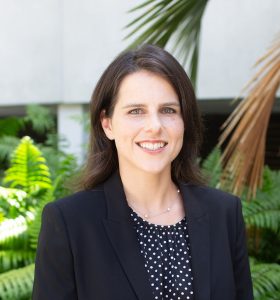 Deborah Goldfarb, attorney and assistant professor of psychology, spends her days attempting to unravel the mysteries of some of the world’s most complex organizations – the workings of our memories and the intricacies of the U.S. legal system.
Deborah Goldfarb, attorney and assistant professor of psychology, spends her days attempting to unravel the mysteries of some of the world’s most complex organizations – the workings of our memories and the intricacies of the U.S. legal system.
Goldfarb received her law degree from the University of Michigan Law School. She worked for years as an attorney, including clerking in the federal courts. During her practice, she realized that many questions within the legal system could be addressed with empirical research, and eventually decided to pursue a Ph.D. in development psychology.
She attended University of California, Davis, where she worked closely with Distinguished Professor of Psychology Gail Goodman, a noted researcher whose work on developmental issues within a legal framework has been cited twice by the Supreme Court. “It’s important for the law to think about who a person is,” she says. To that end, Goldfarb examined the relationship between law and society, both how individuals learn to think about the law and the legal system and how the legal system impacts the way individuals think about social groups.
Goldfarb also worked in memory research. In a study that began in the 1980s, data was collected on alleged sexual abuse offenses committed on children and teenagers. Thirty years later, those individuals, now adults, were interviewed to determine the accuracy of their memories, and the results showed that memories of sexual abuse and trauma can be accurately recalled even decades later.
This study recently received much attention this summer, released as it was shortly before Dr. Christine Blasey Ford’s testimony during the Brett Kavanaugh confirmation hearings accusing him of sexual assault while they were teenagers. “Some memories fade with time, and some memories stay with us,” she says. Time alone should not preclude people from testifying about prior sexual assault. An overview of the findings, which were based on longitudinal studies of 217 participants and 30 participants, has been published in Child Development Perspectives, a journal of the Society for Research in Child Development.
Goldfarb’s main recent memory research project follows children who were part of a study on child maltreatment in the 1990s. They are following them now, twenty years later, to see how well they remember certain details of the forensic medical exam (with results showing that many of them can accurately recall sensitive parts of that exam). Other current research projects include an examination of interview techniques and the effects of suggestive questioning on memory and testimony.
Goldfarb joined the FIU community just this past August. With her training in the intersection between law and psychology, becoming a Panther seemed like a perfect match, as FIU is one of the few universities in the world with a doctoral concentration in legal psychology and is well-respected in psychology-law circles. “It’s an incredible opportunity – you can conduct research in a lab, but also talk to the groups we hope to be affected by that research.” Goldfarb has done just that – conducted continuing learning education courses for attorneys, spoken at conferences, worked with child advocacy groups. “It’s fascinating to have these conversations about what the legal system needs. There are so many different ways to grow.”
FIU Women in Research is a regular feature of ADVANCE News that examines the impressive work female faculty members are doing at the university.
